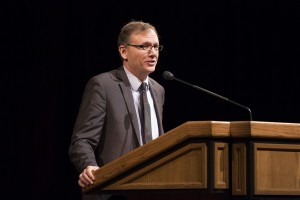
Professor Scott Sprenger’s July 15 forum address coincides with his departure from BYU. Sprenger, associate dean of the humanities, will leave BYU after 21 years of employment. He recognized Madison Sowell, who “took a chance,” convincing him to leave Washington D.C. to come to BYU.
“I said, ‘take a chance on me,’ a second ago because in order to provide context for my remarks today, I think it’s worth mentioning up front that I am not a member of the LDS church,” Sprenger said.
Sprenger’s French students often learned he isn’t a member of LDS church mid-semester, around the same time they asked, “In which French-speaking mission did you serve? The question always followed, whether verbalized or not, “So how is that you’re at BYU?”
Sprenger then showed slides of the five things he will miss most about BYU. The first slide showed a picture of the iconic mint brownie. He joked about how he didn’t like it at first, but grew into it after attending numerous meetings with no other refreshment options. He then moved on to his “real list” of things he’ll miss.
#5 The setting
“I’m not telling you anything you don’t know, but it’s worth saying that the setting—the campus, the JFSB building, and especially the mountains are spectacular,” Sprenger said.
#4: Colleagues
Sprenger has had the opportunity to meet and work with fellow professors from all across campus. He could talk about them for hours if he had the chance.
#3: BYU’s mission
BYU’s mission of teaching secular knowledge in the context of spiritual knowledge has affected Sprenger’s teaching, course offerings and research. His first students gave him high scores for classroom management and teacher competency, but they gave him poor reviews on the spiritual side.
“It’s a little surprising, but nobody told me before they sent me into the classroom that I would be evaluated for such things like ‘being spiritually inspiring’ or ‘bringing gospel insights’ to the subject matter, even to French grammar,” Sprenger said. “I had no idea what that meant.”
Sprenger eventually turned the spiritual criteria into terms that made sense to him, “caring as deeply as possible” about his students.
#2: Bilingualism and biculturalism
International students and students who serve foreign missions have a head start in appreciating the discipline of the humanities. It’s no surprise Sprenger recognizes it as one of BYU’s strengths.
#1: The students
Sprenger guest-taught a French literature class as part of his interview process. He was surprised to meet such smart, energetic and curious students. He noted their language ability was “simply off the charts.”
“I understood the minute that I stepped foot on campus that BYU is the most unique academic community in the United States, if not in the entire world because of its students,” Sprenger said. “It was clear to me immediately that BYU students were positioned for success in the international arena in ways that no other university, not even the Ivies, could ever match.”
The future of humanities
Sprenger shifted gears and addressed the subject of humanities in a society that has forgotten their importance. Harvard University’s School of Humanities has seen a 35 percent loss of students between 2006 and 2012. But Sprenger defended the importance of humanities, citing that 70 percent of employers want employees with mixed disciplined backgrounds.
“There are really only two choices for graduates wanting a lot of options, to be a technically savvy liberal arts graduate or a liberally educated technical graduate,” Sprenger said. “The concept is hybridity!”




